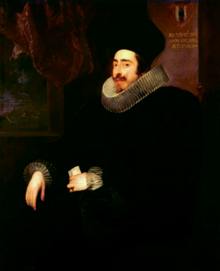Draft:Giovanni Vincenzo Imperiale: Difference between revisions
From Wikipedia, the free encyclopedia
|
Tags: Mobile edit Mobile web edit
|
|
||
| Line 4: | Line 4: | ||
|
== Biography == |
== Biography == |
||
|
Giovanni Vincenzo Imperiale was born in 1582 at [[Sampierdarena]] (a suburb of [[Genoa]]). He was the only son of eight siblings born to one of the five leading families of Genoa whose importance and wealth had been established in the [[16th century]]. His mother, Bianca Spinola, was the sister of [[Orazio Spínola|Orazio Spinola]], the future archbishop of Genoa. We have little information about his youth and cultural formation. By the age of 18 Giovanni Vincenzo was a member of the Accademia dei Mutoli and at 25 he published the poem ”Stato Rustico”, which established his fame as a poet. He corresponded with other celebrated poets of his age such as [[Giambattista Marino]]. In his sprawling poem ”L’Adone”, published in 1623, Marino makes specific reference to Giovanni Vincenzo: Imperiale appears in [[canto]] 18 as the [[shepherd]] Clizio (the protagonist of the ”Stato rustico”) who warns [[Adonis]] of the dangers of hunting the [[Wild boar|boar]] and then laments his friend’s death. In his early 20s, Giovanni Vincenzo was admitted to the prestigious Accademia degli Addormentati, whose members included [[Gabriello Chiabrera]], [[Angelo Grillo]] and Ansaldo Cebà. |
Giovanni Vincenzo Imperiale was born in 1582 at [[Sampierdarena]] (a suburb of [[Genoa]]). He was the only son of eight siblings born to one of the five leading families of Genoa whose importance and wealth had been established in the [[16th century]]. His mother, Bianca Spinola, was the sister of [[Orazio Spínola|Orazio Spinola]], the future archbishop of Genoa. We have little information about his youth and cultural formation. By the age of 18 Giovanni Vincenzo was a member of the Accademia dei Mutoli and at 25 he published the poem ”Stato Rustico”, which established his fame as a poet. He corresponded with other celebrated poets of his age such as [[Giambattista Marino]]. In his sprawling poem ”L’Adone”, published in 1623, Marino makes specific reference to Giovanni Vincenzo: Imperiale appears in [[canto]] 18 as the [[shepherd]] Clizio (the protagonist of the ”Stato rustico”) who warns [[Adonis]] of the dangers of hunting the [[Wild boar|boar]] and then laments his friend’s death. In his early 20s, Giovanni Vincenzo was admitted to the prestigious Accademia degli Addormentati, whose members included [[Gabriello Chiabrera]], [[Angelo Grillo]] and Ansaldo Cebà. |
||
|
== Works == |
== Works == |
||
Latest revision as of 21:12, 17 June 2023
| Draft article not currently submitted for review.
This is a draft Articles for creation (AfC) submission. It is not currently pending review. While there are no deadlines, abandoned drafts may be deleted after six months. To edit the draft click on the “Edit” tab at the top of the window. To be accepted, a draft should: It is strongly discouraged to write about yourself, your business or employer. If you do so, you must declare it. Where to get help
Improving your odds of a speedy review To improve your odds of a faster review, tag your draft with relevant WikiProject tags using the button below. This will let reviewers know a new draft has been submitted in their area of interest. For instance, if you wrote about a female astronomer, you would want to add the Biography, Astronomy, and Women scientists tags. |
Giovanni Vincenzo Imperiale (1582–1648) was an Italian nobleman, art collector, and man of letters.
Biography[edit]
Giovanni Vincenzo Imperiale was born in 1582 at Sampierdarena (a suburb of Genoa). He was the only son of eight siblings born to one of the five leading families of Genoa whose importance and wealth had been established in the 16th century. His mother, Bianca Spinola, was the sister of Orazio Spinola, the future archbishop of Genoa. We have little information about his youth and cultural formation. By the age of 18 Giovanni Vincenzo was a member of the Accademia dei Mutoli and at 25 he published the poem Stato Rustico, which established his fame as a poet. He corresponded with other celebrated poets of his age such as Giambattista Marino. In his sprawling poem L’Adone, published in 1623, Marino makes specific reference to Giovanni Vincenzo: Imperiale appears in canto 18 as the shepherd Clizio (the protagonist of the Stato rustico) who warns Adonis of…
Read More: Draft:Giovanni Vincenzo Imperiale: Difference between revisions



